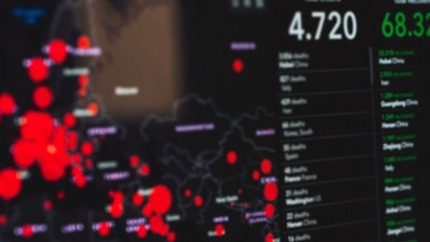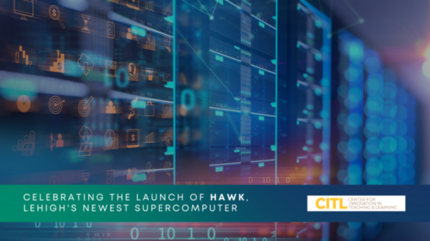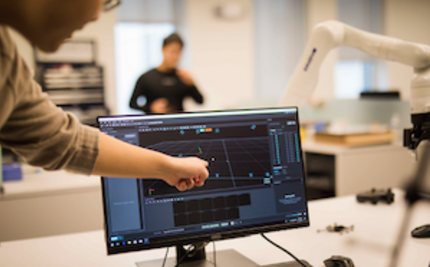This is an edited of the original Newsletter to include contributed articles only
Directors' Message
The COVID-19 pandemic has highlighted the importance of data, intelligent systems, and computation.

The COVID-19 pandemic has highlighted the importance of data, intelligent systems, and computation. They have enabled rapid advances in scientists’ understanding of the disease and have shaped the public’s perception of it. At the same time, the pandemic has shined a spotlight on the gaps in our data, the inequities in medical outcomes, and the ubiquity of misinformation. The challenges faced in the pandemic highlight the importance of interdisciplinary discovery, problem solving, and application. I-DISC scholars represent just such an interdisciplinary approach.
The COVID-19 pandemic has highlighted the importance of data, intelligent systems, and computation. Data dashboards have become a mainstay of pandemic-related communications, from the Johns Hopkins global COVID-19 map to the New York Times US case count to Lehigh’s own coronavirus dashboard. and scientific data collected in laboratories, hospitals, and biotech firms have been disseminated with astonishing speed and openness. These data have been critical in the identification of COVID-19 hotspots and the rapid development of vaccines.
At the same time, the gaps in our data have been put into sharp relief. COVID-19 cases and deaths are likely underreported, especially in vulnerable communities, propagating further inequities in treatment. A lack of visibility into the supply chain for vaccines (and toilet paper!) has led to shortages and confusion. COVID-19 data have been misused and misrepresented, through carelessness or malicious intent, complicating the transformation of data into information. Every type of data is susceptible to misuse, but the mishandling of COVID-19 data has particularly severe consequences.
Rapid innovations in intelligent systems have assisted decision makers in the time of COVID-19. Mobile apps have facilitated contact tracing and health monitoring. Machine learning and artificial intelligence have been used to improve screening and treatment. Thanks to intelligent systems, we can schedule contactless appointments with our doctors using telehealth systems; we can order contactless delivery of food using grocery-delivery apps; we can make contactless purchases using mobile payment apps.
But “intelligent” systems, or their misuse, have also been responsible for significant failures. Stanford Medicine blamed an algorithm for the fact that many front-line workers were passed over in the first wave of vaccine distribution. The UK’s National Health System spent £22 billion on a test-and-trace system, only to scrap it due to low utilization rates and a failure to draw on international expertise.
Computational resources have been marshalled in the effort to fight the coronavirus. The 6.8 million cores in the COVID-19 High Performance Consortium have supported projects related to aerosol dispersion, population vulnerability, and drug discovery. Computational immunology is credited for the record speed at which successful vaccines have been produced. Researchers are using supercomputers to build high-resolution models of the 200 million atoms on the exterior of the SARS-CoV-2 virus.
But computational power doesn’t exist in a vacuum. It relies on data, and science, and human expertise. The potential societal benefits of this research will be tempered by our willingness to listen to the recommendations of the experts who build and analyze the computational models, and by policy makers’ ability to communicate through a fog of misinformation, conspiracy theories, and bias. Like all great human endeavors, the fight against COVID-19 is an interdisciplinary one.
Researchers at Lehigh’s Institute for Data, Intelligent Systems, and Computation (I-DISC) are tackling a wide range of interdisciplinary challenges. These scholars are engineers and computer scientists, chemists and biologists, economists and sociologists, journalists and psychologists, mathematicians and epidemiologists. They come from 22 departments, representing all five of Lehigh’s colleges.
I-DISC faculty members are forecasting COVID-19 outbreaks and tracking tumor cells. They are making algorithms more humane and making robots more dexterous and perceptive. They are using quantum computers for complex optimization problems. They are optimizing power grids and mining medical data. They are ensuring the resilience of critical infrastructure. They are developing computational methods for identifying the building blocks of porous materials. They are rebuilding trust in visual media and combatting human trafficking. And they are building supercomputers to power it all.
The challenges faced in the COVID-19 pandemic highlight the importance of interdisciplinary discovery, problem solving, and application. I-DISC brings together scholars from diverse disciplines and supports the process of addressing a range of real-world challenges.
Research Highlights
HPC cluster Hawk

HPC cluster Hawk will enable new research collaborations across Physics, Chemistry, Biology, Computer Science, Engineering
Interested to learn more on how HPC and the new cluster Hawk can assist I-DISC faculty in achieveing their research goals or if you are interested to use Hawk for workshops, please reach out to Alex Pacheco (alp514@lehigh.edu). Alex will work with faculty to develop a plan for the workshop.
A group of faculty from the Rossin College and Lehigh’s College of Arts and Sciences were recently awarded a grant from the National Science Foundation Campus Cyberinfrastructure program to construct a new high-performance computational cluster, Hawk, that includes both CPU and GPU compute technology.
This acquisition was made available for general access on December 7, 2020, and it has significantly increased Lehigh's high-performance computing capabilities. HAWK will provide critical infrastructure for broader incorporation of computation in science and engineering research, and it will serve as a springboard for new collaborative studies in areas including energy, materials, health, and aerospace.
HAWK will also be used in education around computation at various levels, supporting efforts to increase the number of members of underrepresented populations in STEM-related professions through research experiences, programming workshops, and other computational training opportunities.
In the near future, HAWK will be accessible via the national Open Science Grid (OSG), increasing Lehigh's visibility among the nation’s research computing community.
On Thursday, January 28, the Research Computing Steering Committee hosted a half-day virtual symposium (1-5:30PM) to celebrate the launch of Hawk.
The symposium provided an overview of Hawk, with details about how to access the new cluster, upcoming events organized by Research Computing and LTS, and future plans.
There were presentations on the vision for HPC at Lehigh given by Provost Nathan Urban and Deans Bob Flowers and Steve DeWeerth. The online event also featured three invited talks spanning the different colleges to showcase a sampling of crosscutting computational research on campus that requires large-scale computing that Hawk will now further enable.
Source: RCREAS News Webpage
New Research Group: Human Centered Computing

As humans face a growing reliance on computer-mediated behaviors of all sorts, the need for smarter human-technology interfaces is also growing. This semester I-DISC is launching a new research group in human-centered computing.
The growth of our dependence on computer technology has accelerated in recent years and dramatically more so during the pandemic, as technology now supports a wider variety of activities as our work and personal lives have been upended by requirements for physical distancing. As humans face a growing reliance on computer-mediated behaviors of all sorts, the need for smarter human-technology interfaces is also growing. This semester I-DISC is launching a new research group in human-centered computing.
As spring term started, a core group of faculty across three colleges kicked off the new research focus. They met to share individual research interests and approaches, exploring areas of overlap and compliment in their research portfolios. A sampling of topics included the formation of and social dynamics within online groups, the development of beliefs and preferences in domains of conspiracy theories and online purchasing, the cognitive demands of multitask computer interfaces, and data protection and privacy at the individual and group level. Throughout the spring, the team will meet bi-weekly to explore problem areas where interdisciplinary expertise may be applied in designing effective computer environments that support individual and societal wellbeing. Individual interested in connecting with this new research group should contact Kate Arrington, kate.arrington@lehigh.edu.
I-DISC launches the I-DISC Fellows Program

I-DISC launched the I-DISC Fellows Program at the beginning of 2021.
I-DISC Fellow Dan Luo is an advanced doctoral student with expertise in data science, computation, and machine learning. From bugs to stars and healthcare to linguistics, Dan has worked on a diverse range of projects with faculty from across the Lehigh community, providing assistance to help advance the data-science part of their research.
Examples of projects the I-DISC fellow has worked on since the inception of the program in January 2021:
Data Understanding
In the era of big data, are all the data reliable? Understanding the data is the first step.
Dan is helping faculty members from Economics and ECE develop a framework for risk assessment and management for electricity grid operations and planning systems.
Image Understanding and Computer Vision
A key task of data science is to understand an image with the assistance of a computer.
Dan has been working on multiple projects related to this within the healthcare industry. In one project, Dan is helping a faculty member from Bioengineering develop a standalone, user-friendly, robust, cloud-based computational tool for hemolysis evaluation. In another project he is helping an MEM faculty member to develop an ML method to close the gap of radiographic scoring and human-subjective judgement.
Natural Language Understanding
Our ideas and thoughts are revealed via language. Dan has been helping faculty apply a powerful natural language processing technique to help their research. For example, he has helped a Psychology faculty member to investigate human attitudes toward insects by sentiment analysis. In a project for another Psychology professor, the I-DISC Fellow has helped create a searchable data system and write code to analyze data for linguistic and semantic questions. Finally, Dan is building a tool that a faculty member from Marketing can use to determine signals that people’s attention on social media.
Learn more about the I-DISC Fellow Program and how an I-DISC Fellow can help you advance your research.
This program is open to all faculty across all 5 Lehigh University colleges.
